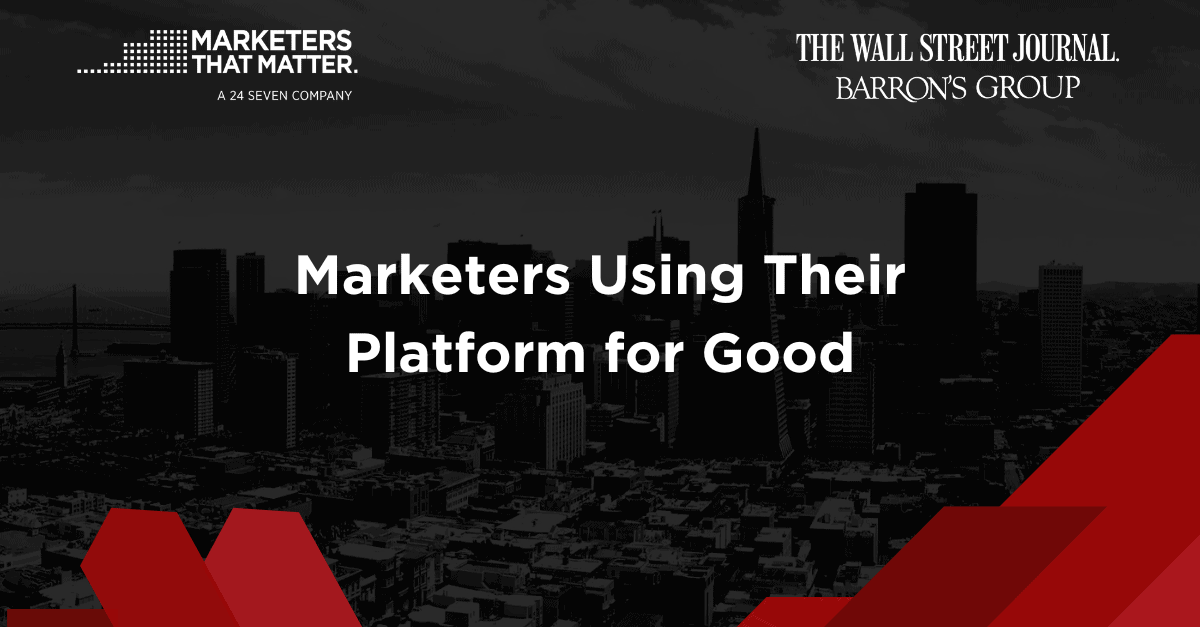Marketing leaders today are the embodiment of human swiss army knives, according to Lara Balazs, EVP, CMO, and GM of the Strategic Partner Group at Intuit. To be an effective CMO, you can’t just be the best at marketing—it’s a lot more than that; having a well-rounded skill set is essential. There’s one element, in particular, that makes marketing leaders admirable: benevolence. After conversations with 80 marketing leaders on MTM Visionaries, we are deeply impacted by those who have realized the power of their voice and are using their platform for the good of humanity.
Below are Visionaries who are going the extra mile to create important change.
Find the MTM Visionaries Podcast On Apple, Spotify, and Amazon, or check out the recaps in the following links.
DE&I Champions
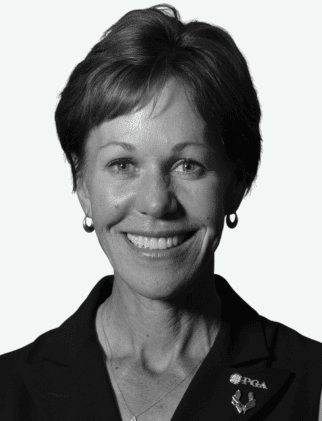
We aimed to create a platform that showcased the game as a form of entertainment and encouraged all people to participate in it. We still have a long way to go in promoting women’s sports and non-white players in the game. At Golf Nation, we are committed to showcasing the true face of golf and making it an enjoyable experience for everyone, no matter what they look like.
–Suzy Whaley, President at Golf Nation
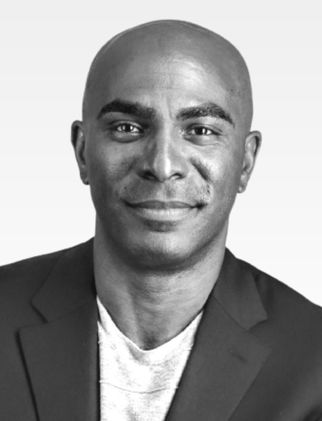
“I co-founded Monday Night Mentorship to bring together a community of leaders who love to mentor and give back their time. The sole purpose is to accelerate the careers of marketers of color, who were left behind during the pandemic. Talent and skills shouldn’t stop with executive leaders; we should take whatever we’ve learned from years of experience and give it to somebody at the beginning of their career so they can be exponentially better.”
–Jabari Hearn, (Former SVP of Marketing and Entertainment Westbrook), Managing Partner, AKQA LA

“When I moved to America. I realized we had a reverse marketing problem. Digging into the issue, I saw systemic barriers for Latinos, such as education, health, gender, and jobs. While these issues need attention, the real obstacle keeping us from dismantling these barriers is that we are a fragmented, un-unified, and invisible community. Latinos are not united by language, country of origin, political party, or first or second generation; we are unified by our desire to progress, move forward, and achieve the American Dream.
The Hispanic community needed a unifying symbol, a platform to raise awareness of the incredible contributions of Latinos, market solutions for companies who want to engage with Latino employees, suppliers, and consumers, and a framework that brings together Latino organizations to amplify and accelerate their goals.
Through the Hispanic Star, we created an ecosystem and developed instruments for the Latino Community to be unified and have a shared agenda. More than 300 companies are a part of Hispanic Star, 100 Latino organizations are represented, 50 million Latinos are a part of the community, and we have chapters in 30 cities across the country.”
– Claudia Romo Edelman, Founder, We Are All Human

“The Asian Americans and Pacific Islanders (AAPI) community has faced a ceiling because upper management C-suites don’t see us as leadership material. One way to actively break these stereotypes is by speaking out and being yourself. I wear Jordans, Air Max, and hoodies all the time because I don’t need to play dress-up to be a leader and an executive. My awards, accolades, and the way I do things should speak for themselves, and businesses should be okay with that.”
– Eric Toda, Head of Meta Prosper and Global Head of Social Marketing, Meta
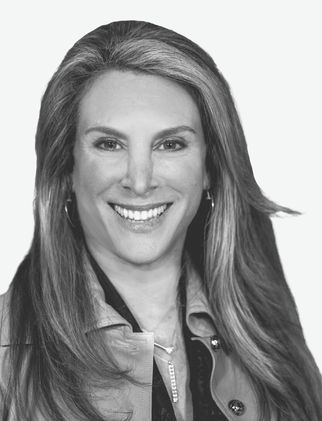
“With my team at The Female Quotient (FQ) and in partnership with Gail Tifford and Patty Kerr, we brought the #SeeHer movement to the Association of National Advertisers (ANA) to bring more visibility into how the media portrays women. Our motto, “If you can see her, you can be her,” is about the accurate and realistic portrayal of girls and women in marketing, advertising, media, and entertainment. Females need to see themselves as they are in all their potential.
Unfortunately, too many ads still play upon old stereotypes, reinforcing bias, inequity, and uncertainty of equality of females for the whole world to witness. Inclusivity in advertising isn’t just a nice-to-have or ’the right thing” to do’; it’s fundamentally good for business. Expanding the range of who you represent in your content means more people will identify with it, building a bridge for the brand to have an even greater customer pool and sales pipeline.”
– Shelley Zalis, CEO, The Female Quotient
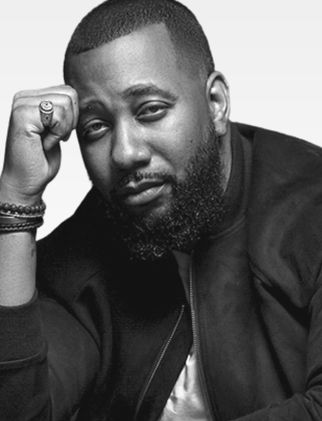
“Starting Diverse Creatives with Ron Lewis was a big turning point for me. Two years ago, agencies were saying they wanted to find creatives of color, but couldn’t find them. Oddly enough, at the same time, I was creating a list of Black Creative Directors. Ron was working on a similar list, so we started talking and decided to do something about it by launching this platform. It is entirely free with the intent to level the playing ground, create opportunities, and show the world that these people exist, and now there are over 2,700 creatives on the list.”
– Walter Geer III, Chief Experience Design Officer, VMLY&R
Dismantling Injustices
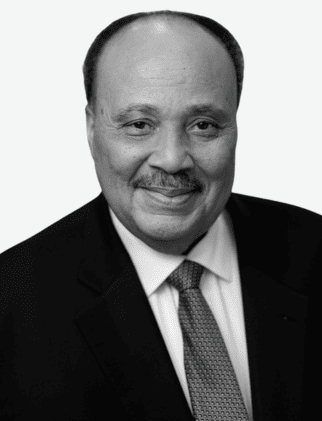
The King brand stands for number one, unity. It stands for love. It stands for bringing people together to do good in the world.
– Martin Luther King III, President, Drum Major Institute
The Bearers of Good News
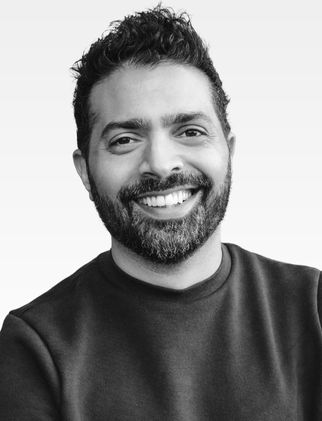
“We have an initiative called GoFundMe Heroes, where every two weeks, we showcase the stories of incredible people on the platform doing acts of kindness in their communities. Far more good things are happening than harmful; they just don’t get told.
We have seen society evolve – data shows that one of our fastest-growing categories last year was weddings; this year, our fastest-growing categories have been Community and Volunteer. We have seen people’s desire to help their communities on the rise. I love this because we have all recognized that we can’t solve big problems, but we can solve them locally.”
– Musa Tariq, CMO, GoFundMe

“There are several examples across our organization of people who passionately work to solve important causes, but we must tell these stories from a brand perspective to engage our consumers. Much of our portfolio is focused on families; family sustainability and food security have always been the core of our mission.
One of our current focuses has been on school lunches. On our food service team, we created a program called, “Keeping Kids Fed.” Through this program, we remind people about the application paperwork for free school lunches because the last thing we want is for a kid to go to school and not have food.
Another focus has been on the sustainability of our soil. Many are disconnected from the fact that every single box of cereal came out of a field and was nurtured by a farmer. We’ve been on a regenerative agriculture journey, and we are committed to a million acres of regenerated farmland by 2030—but we have to tell the story of what that means through our brand.”
– Doug Martin, Chief Brand and Disruptive Growth Officer of General Mills
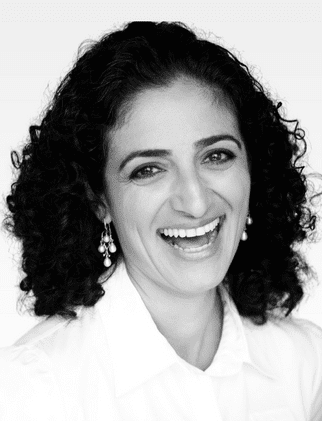
“After reading an article listing the most influential people, I decided we need to celebrate the real heroes who have been there and whose names we don’t know. We started an inaugural Nextdoor 100 where we invited the community to nominate an outstanding neighbor. People started posting, and before we knew it, we received 46,000 submissions. We recently announced 100 winners- if you are ever having a low day, go to Nextdoor 100 and read these submissions.”
– Maryam Banikarim, (Former Head of Marketing, Nextdoor), Founder, MaryamB
The Mindful Marketers

“At Pinterest, we want our Creators and content to inspire action in the offline world, which is good for business and even better for humanity. We want our users to interact, learn about themselves, get inspired, and feel motivated to act.
So, we recently launched Shuffles, an app that aims to inspire creative exploration and confidence. It’s a beautiful app that encourages you to dream, imagine, remix images and ideas, and spend time in creative play.
The way the app has taken off has signaled to me that people are needing a place for themselves. We want to protect our users’ selfhood and enhance their lives; we do not want to drain them or keep them glued to their phones. We want them to feel a deeper connection to themselves and the things that matter so they have the creative confidence to start building.”
– Andréa Mallard, CMO, Pinterest
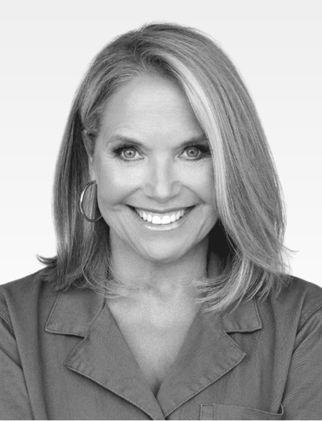
“It’s not just an economic crisis we’re confronting, it’s a crisis of confidence. Climate change, unprecedented mental health challenges, financial worries, automation, a changing workplace, polarization. Many people are feeling lost, powerless, and anxious. They’re desperately seeking positivity, optimism, and hope that we can individually and collectively make the world a better place. It’s a great opportunity to really emphasize our individual and collective humanity.”
– Katie Couric, Award-Winning Journalist and Co-founder at Katie Couric Media
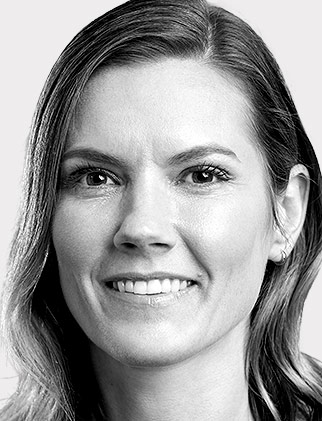
“Our mindfulness and meditation services were tools to help support people through the pandemic, and they allowed them to navigate how they felt and express what they were going through.
People were looking for community during that time, and even though our brand has been bringing people together physically for 25 years, we had to pivot to make our platform accessible online. We also saw a significant uptick in interest in our product to start new healthy routines and find comfortable apparel.”
– Nikki Neuburger, Chief Brand Officer of lululemon
Innovators of Better and Safer Solutions
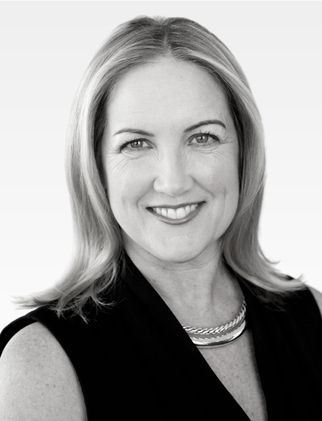
“Our CEO, Mary Barra, envisions a world with zero crashes, zero emissions, and zero congestion. It is the first time someone stated the unintended consequences of this industry over the last century, and we’re working to create change towards an all-electric future of mobility with accessibility for everyone.”
– Deborah Wahl, Global CMO of General Motors
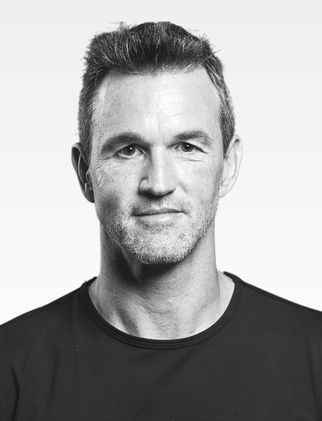
“Real Tone” is one of the most incredible things that came out of our “20% time”. The Pixel 6 phone can now photograph each skin tone equally for the first time in history. What is most exciting to me is the genesis of this innovation. A young man on my team, Florian Koenigsberger, was 25 years old when he started spending his 20% time on this project.
When he was photographing himself or people who looked like him, the quality wouldn’t appear the same as people of lighter skin tones. He requested to spend his time trying to understand why, and traced it back to the invention of Kodak’s “Shirley” cards in the 1950s. Unfortunately, unconscious biases affected color references, and color correction was placed into the film, whether it was still or moving.
Florian worked with a group of engineers at Google to redefine the photo reference library. They optimized the hardware and the AI (Artificial Intelligence) we use to process pictures, and we adopted a new skin tone scale called the Monk scale with ten delineations of skin tone color. “
–Nick Drake, Vice President, Global Marketing, Google
More Insights You May Enjoy…
For more insights from our 2022 MTM Visionaries Replay, click here to see what other common themes surfaced.
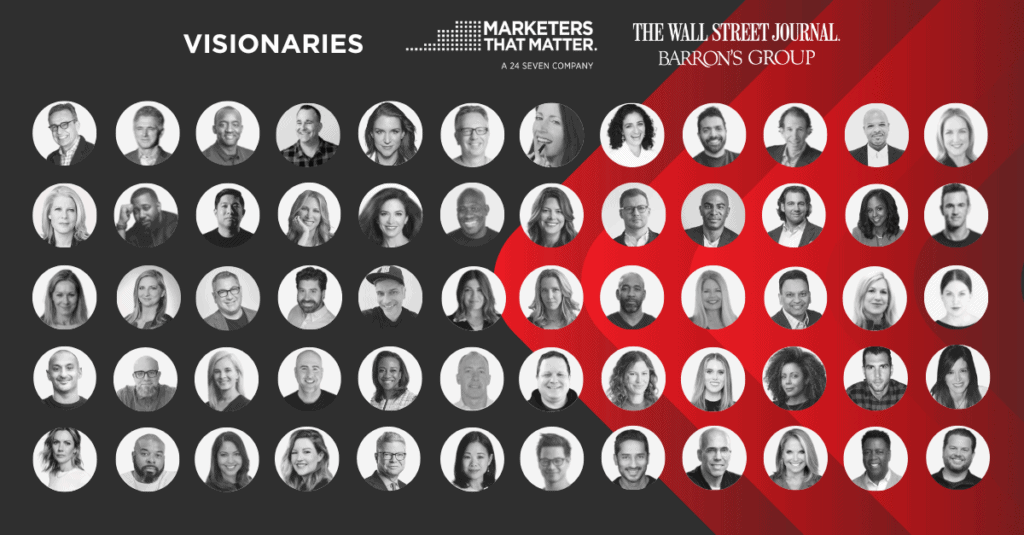
__________________________
Visionaries, hosted by Nadine Dietz, airs every week and is brought to you in partnership with The Wall Street Journal. Each week, two new visionaries share their game plan and how that impacts today’s teams, talent, and hybrid work environment.
Marketers That Matter® Is A Community of Top Marketing Executives Coming Together to Pioneer the Future of Marketing, Sharing Real-Time Experiences, And Solving Current Challenges.
Our Parent Company, 24 Seven, Specializes In Helping You Find Exceptional Marketing And Creative Talent For Your Teams.

